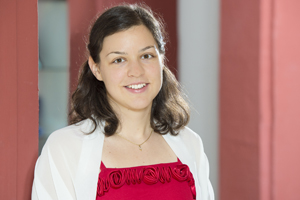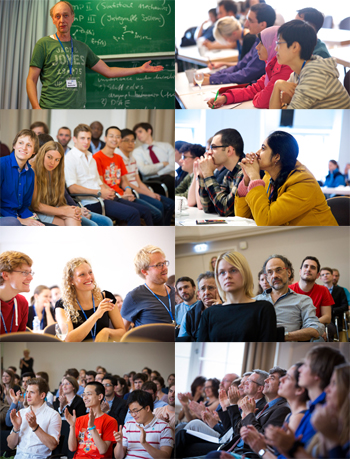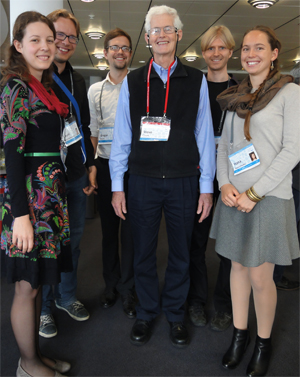
|

Lizaveta from Belarus

Sorelle from Cameroon

Sofía from Colombia

Martha from Uganda

Sophia from the US

Li Li from China

Ángel from Spain

Yoanna from Bulgaria

Abhinav from India

Dragana from Serbia

Alexander from the United Kingdom

Simona from Bulgaria

Efstathia from Greece

Evgenia from Russia
BMS Alumni receive Tiburtius PrizesBMS alumni Robert Altmann and Atul Shekhar were recognized for their scientific achievements at the 2016 State Conference of Rectors and Presidents of Berlin Universities (Landeskonferenz der Rektoren und Präsidenten der Berliner Hochschulen).
The State Conference of Rectors and Presidents of Berlin Universities (LKRP) annually awards three Tiburtius Prizes and three awards of recognition to recent PhD graduates from Berlin's universities for their outstanding doctoral theses. The prize-giving ceremony was held at the FU Berlin on 22 November 2016. Many congratulations to Robert and Atul!
German-language source: Looking back at the BMS 10th Anniversary celebrationThe Berlin Mathematical School is ten years old! Established in 2006, the BMS has flourished into a highly successful graduate school currently consisting of more than 200 students and boasting a PhD alumni community of over 210 academics and professionals. In ten short years, the BMS has welcomed aspiring young mathematicians from over 50 countries, reached its goal of 50% international students, and achieved a ratio of 31% female students. From 17 to 18 November 2016, the BMS held a colorful program of events in celebration of its tenth birthday. The festivities began in advance at the TU Berlin Mathematics Library on the evening of 16 November with a BMS Welcome Reception combined with the opening of "Art on Board: the Beauty of Math". This art exhibition showcases early mathematical prints by Bernar Venet and aquatints from the "Concinnitas Portfolio" and will run until 28 February 2017.
On the morning of 17 November, the main event took off in the Audimax at TU Berlin. Seven talks were given by distinguished speakers active in different BMS research areas. Each plenary speaker was introduced by two BMS students from the same area of research. Prior to each talk, several BMS students and one of the guest speakers gave very enjoyable and moving vocal and instrumental musical performances.
Over half of the BMS student body attended the main event to take advantage of the opportunity to learn from outstanding mathematicians from all around the world. In between the scheduled talks, there was time to socialize with the seven guest speakers, around forty external guests, and over sixty BMS faculty, staff and alumni. At the end of the first day, the BMS student representatives held an (unexpectedly) fun "Math Quiz", which was followed by a buffet reception in the early evening. The chance to network prior to the main event was not lost as BMS students were invited to take part in a World Café. This event was designed to offer current students the opportunity to meet and chat to BMS alumni and postdocs about various topics such as PhD research, applying for postdoc positions and job availability in the private sector.
In recognition of ten years of the BMS, some of the opening speeches were made up of just ten sentences. The BMS Chair, Günter M. Ziegler, presented ten sentences composed by a BMS alumna in which she emphasized the more profound values of a university education. Opening speeches were also given by Christian Thomsen (President, TU Berlin), Peter A. Frensch (Vice President for Research, HU Berlin), Peter-André Alt (President, FU Berlin) and Steffen Krach (Berlin's State Secretary for Science).
In his closing speech at the end of the two-day celebration, Professor Ziegler held fast to his newly invented tradition and gave ten sentences of thanks to everyone involved in organizing, presenting, participating, supporting and attending the BMS 10th Anniversary events. In a recent interview, he said "The BMS has achieved so much in ten years: it has changed the mathematical landscape in Berlin, brought international students from the world over to this city, and has created a concept and given a face to studying mathematics in Berlin." The Berlin Mathematical School would like to extend its heartfelt thanks to everyone who has helped to make the past ten years so successful. We are very excited about the next ten years, so watch this space! Humboldt Prize & Marthe Vogt Award for Mira Schedensack
Problems from mechanics are often solved using mathematics. For example, if a building engineer wants to know how a balcony will deform under a heavy load, mathematicians can describe this by means of partial differential equations. Usually, the solutions cannot be calculated exactly, so they are approximated using numerical methods. Thus the reliable numerical approach of such solutions plays a fundamental role in the mechanical application. For engineering practice, such procedures have to be easy to implement, deal sparingly with computer resources, and provide the most accurate results possible. For more than 50 years, mathematicians around the world have been researching extensively on how to improve this method, but in this area there was not much new to discover. The best minds had already developed the most efficient methods. Then Mira took up the challenge with an excellent dissertation that presented fundamentally new and sensationally easy-to-implement procedures. In her PhD thesis, Mira abandons the conventional approach to the approximation of PDE solutions and makes use of the characterization of the derivative as a conservative vector field via a Helmholtz decomposition, which breaks down an unstructured vector field into a gradient and a rotation field. Mira explained "There were no simple methods to solve problems of higher order. Whether or not I would find practical procedures was not initially clear, but the theory fascinated me." Mira wanted to do something completely new and not simply improve old methods. "That would certainly have been safer. My approach was risky, but I found it exciting" she said. As a BMS scholarship holder, Mira did her PhD under the supervision of BMS faculty member Prof. Dr. Carsten Carstensen. She completed her doctorate at the HU in 2015 and graduated with summa cum laude. Currently, Mira is a postdoctoral researcher at the University of Bonn's Institute for Numerical Simulation and also a guest lecturer in the working group Numerical Mathematics at the HU. The Humboldt Prize is an annual award given to outstanding students and young scientists whose final theses are deemed examples of outstanding scientific work. All prizes are awarded by the university president at the opening ceremony of the new academic year. The dissertation prize comes with a monetary award of 3000 euros. The FVB awards the Marthe Vogt Award annually to one outstanding young female scientist who is active in the same field as any of the eight research institutes represented by the FVB. This prize is also endowed with 3000 euros. Mira, congratulations on your achievements! German language sources: https://www.hu-berlin.de/de/ueberblick/menschen/ehrungen/humboldtpreis/archiv/humboldt-preis-2016
Klaus Tschira Award for BMS alumna Ágnes Cseh
The Klaus Tschira Foundation (Klaus Tschira Stiftung) established this nationwide competition in 2006 with the aim of fostering public appreciation of natural sciences, mathematics and information technology. The challenge presented to young scientists is to write an article about their research and PhD thesis in a way that is understandable to the scientifically interested, but non-specialist person. This year, the jury chose the six prizewinners from 168 applicants in a three-phase evaluation procedure. For her PhD thesis entitled “Complexity and Algorithms in Matching Problems under Preferences”, Ágnes studied the 'stable marriage problem', which has been in the research spotlight for over 50 years. She succeeded in broadening the scope of this well-known problem in graph theory, which is traditionally illustrated by a mathematical modeling of partner finding. In her winning article, “Marriages are made in calculation” (Heiraten nach Plan), Ágnes describes this model, which has been frequently applied in the business world for decades for the purpose of bringing together different stakeholders in the most optimal way. The wide range of possible applications of this theory includes sports fixtures, living kidney donations, online auctions and the distribution of student dormitories. Ágnes illustrated the existing mathematical model using human partner selection, but her enhanced model is universally applicable. Ágnes was presented with the Klaus Tschira Award on 6 October 2016 at the University of Heidelberg's historical Alte Aula and is the fourth member of the BMS alumni to receive this prize. Tim Conrad was a recipient in 2009, Jannik Matuschke in 2014 and Timo Berthold in 2015. The award came with prize money in the sum of 5000 euros. In addition, all winning articles will be published in their original form in the popular science magazine “bild der wissenschaft”. As a BMS student, Ágnes won the “First Berlin Science Slam” in Cairo in April 2012 and, in November of the same year, she won the first prize in the “Best Master/Diplom Degree” category at the TU Berlin's Dies Mathematicus. In 2013, she was awarded the Clara von Simson Prize for her outstanding master's thesis entitled “Stable Flows”. Ágnes completed her PhD at TU Berlin in 2015 under the supervision of BMS faculty member Prof. Dr. Martin Skutella, and graduated with the honor of summa cum laude. After a research stay at the ICE-TCS (Icelandic Centre of Excellence in Theoretical Computer Science) in Reykjavík, she is now a post-doc at the Hungarian Academy of Sciences in Budapest. Ágnes, congratulations on your success!
BMS 10th Anniversary on 17th & 18th November17-18 November 2016, TU Berlin, AudimaxProgram
18:00 Welcome Reception at TU Berlin, Math Building, Mathematics Library Thursday, 17 November 2016 Friday, 18 November 2016 FU, HU & TU among the top nine universities in GermanyAccording to the recently published QS World University Rankings for 2016/2017, Freie Universität Berlin (FU), Humboldt-Universität zu Berlin (HU) and Technische Universität Berlin (TU) belong to the top nine universities in Germany. The QS World University Rankings assess university performance based on the following six indicators: the institution's academic reputation, the ratio of students to faculty, the number of citations by researchers, the reputation of graduates among employers, the international faculty ratio and the international composition of students. Data from over 900 universities worldwide was evaluated in order to determine the 2016/2017 rankings. Placed among the best universities in Germany, HU, FU and TU Berlin were ranked 5th, 6th and 9th, respectively, and claimed higher positions in comparison with previous results. The three Berlin universities also appear among the best 200 in the world with the FU ranked at 123, the HU at 121 and the TU at 164. BMS students attend the 4th HLFThe 4th Heidelberg Laureate Forum (HLF) took place at Heidelberg University from 18 to 23 September 2016. The HLF is a networking event for mathematicians and computer scientists from all over the world and is organised annually by the Heidelberg Laureate Forum Foundation (HLFF). 200 young scientists from over 50 nations were successful in convincing the foundation's scientific advisory board of their outstanding academic abilities to secure a place at this event, where they were given the chance to interact extensively with 21 Laureates of mathematics and computer science. The Laureates are the winners of some of the most prestigious awards in these two fields: the Abel Prize, the Fields Medal, the Nevanlinna Prize and the ACM A.M. Turing Award. There are several stages in the career of a young researcher during which they may apply to attend the HLF: undergraduate; graduate (in the PhD phase); or postdoc.
Six BMS Phase II students were selected to attend the HLF this year: Gregor Bruns, Ana Djurdjevac, Christoph Gorgulla, Kathlén Kohn, Hana Kourimska und Lauri Loiskekoski. The BMS students took the opportunity to converse with their fellow participants and, in particular, with one of the Laureates, Stephen A. Cook, an American-Canadian computer scientist and mathematician and winner of the ACM A.M. Turing Award in 1982. According to the organisers, this year's “Hot Topic” proved to be one of the highlights of the event: leading researchers and experts examined the current scientific trends in Artificial Intelligence and their applications. It was followed by a broader discussion about how those developments affect our lives and society. BMS Phase II student Christoph Gorgulla said “I had a truly amazing time at the 4th HLF, which is the most well organized conference that I have ever attended. Because of that, one was able to fully concentrate on the science and the interaction with other participants. It was remarkably inspiring and insightful to listen to the lectures of laureates and to talk with them in person. To get to know many brilliant young researchers from all over the world was another extremely valuable experience. I have learned much about various aspects of science which will be very helpful to find my path in science in the future.” The HLF was initiated by Klaus Tschira Stiftung (KTS), a German foundation which promotes natural sciences, mathematics and computer science, and the Heidelberg Institute for Theoretical Studies (HITS). The Forum is organized by the HLFF along with KTS and HITS. It is strongly supported by the award-granting institutions, the Association for Computing Machinery (ACM: ACM A.M. Turing Award), the International Mathematical Union (IMU: Fields Medal, Nevanlinna Prize), and the Norwegian Academy of Science and Letters (DNVA: Abel Prize). A longer news article can be found in English and in German on the HLF website.
|





 Robert was awarded the second
Robert was awarded the second  Atul was honoured with a Tiburtius recognition award for his doctoral dissertation entitled "Rough paths, probability and related topics". The theory of rough paths emerges from numerical methods for differential equations and builds a bridge between analysis and stochastics. Atul completed his PhD under the supervision of BMS faculty member
Atul was honoured with a Tiburtius recognition award for his doctoral dissertation entitled "Rough paths, probability and related topics". The theory of rough paths emerges from numerical methods for differential equations and builds a bridge between analysis and stochastics. Atul completed his PhD under the supervision of BMS faculty member 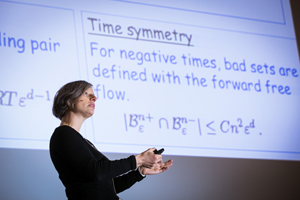
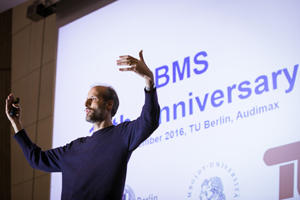
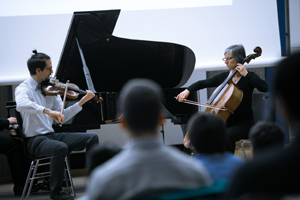
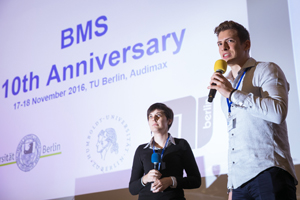
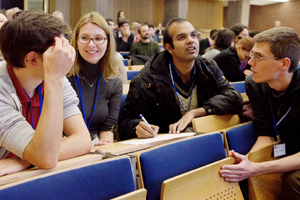
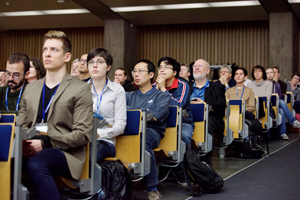
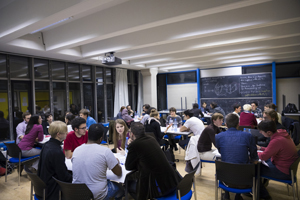
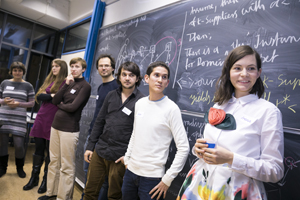
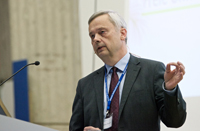
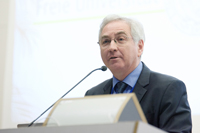
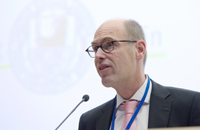
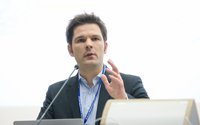
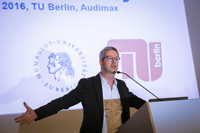
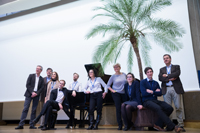
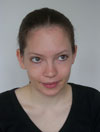 On 17 October 2016, at the opening ceremony of the 2016/17 academic year, five students and young scientists of
On 17 October 2016, at the opening ceremony of the 2016/17 academic year, five students and young scientists of 